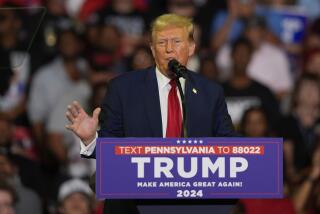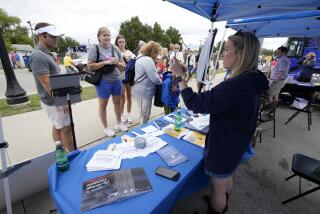Clark Offers a ‘Civilian Reserves’ Plan
- Share via
WASHINGTON — Detailing his call for a “new American patriotism,” Democratic presidential candidate Wesley K. Clark on Tuesday proposed to establish a “Civilian Reserves” that would mobilize millions of Americans for missions at home and abroad.
“Today I want to offer a new call to service,” Clark told an audience of college students in New York City, according to prepared remarks distributed by his campaign. The civilian reserves, he declared, “will reinvigorate America’s ethic of service, tap our vast reservoir of skill, generosity and energy, and call millions more Americans to duty.”
The plan could significantly expand existing federal programs that encourage voluntarism, such as the Peace Corps and AmeriCorps. It also reinforces what is emerging as a central theme of Clark’s presidential campaign: a call for civic engagement that the retired Army general says stems from his 34-year military career.
“The new American patriotism recognizes that it’s not enough to say you’re an American; you have to live it -- with action, deed and commitment,” he said.
The speech was the first of four planned by Clark in the coming weeks as part of an effort to flesh out his fledgling candidacy. The other speeches are to focus on health care, the economy and national security.
Throughout his remarks Tuesday, Clark linked the voluntarism plan to his military career, which took him from West Point to Vietnam to his final position as NATO supreme commander during the Kosovo war. “For me, there was no greater honor -- no way to be nearer to the heart of what mattered in America -- than to be serving and protecting the country,” he said.
Clark’s plan would establish a reserve corps of Americans who could be deployed to needs as varied as fighting fires, responding to a terrorist attack or assisting in nation-building missions.
Under the proposal, all Americans 18 or older would be encouraged, but not required, to register with the Civilian Reserves. Participants would make a five-year commitment to serve in the system, which would operate as part of the Department of Homeland Security. The Department would establish a databank of the reservist’s skills.
Clark said that “in times of need,” the government would request volunteers from the system to serve for up to six months. The volunteers would be paid and guaranteed reemployment at their old jobs, like members of the existing military reserves.
In almost all cases, Clark said, the government would seek volunteers from those in the reserves program. But he said in cases of “grave national emergency,” the president would have the authority to call up as many as 5,000 civilian reservists; to mobilize more should require an act of Congress, he said.
Clark and his aides said their intent would be to deploy the volunteers into existing institutions, from the Red Cross to local police departments.
Jason Furman, policy director for Clark, said the campaign estimates it would cost about $100 million annually to maintain the system. Furman said he could not provide an estimate of how much the government might spend in mobilizing reservists.
More to Read
Get the L.A. Times Politics newsletter
Deeply reported insights into legislation, politics and policy from Sacramento, Washington and beyond. In your inbox twice per week.
You may occasionally receive promotional content from the Los Angeles Times.










